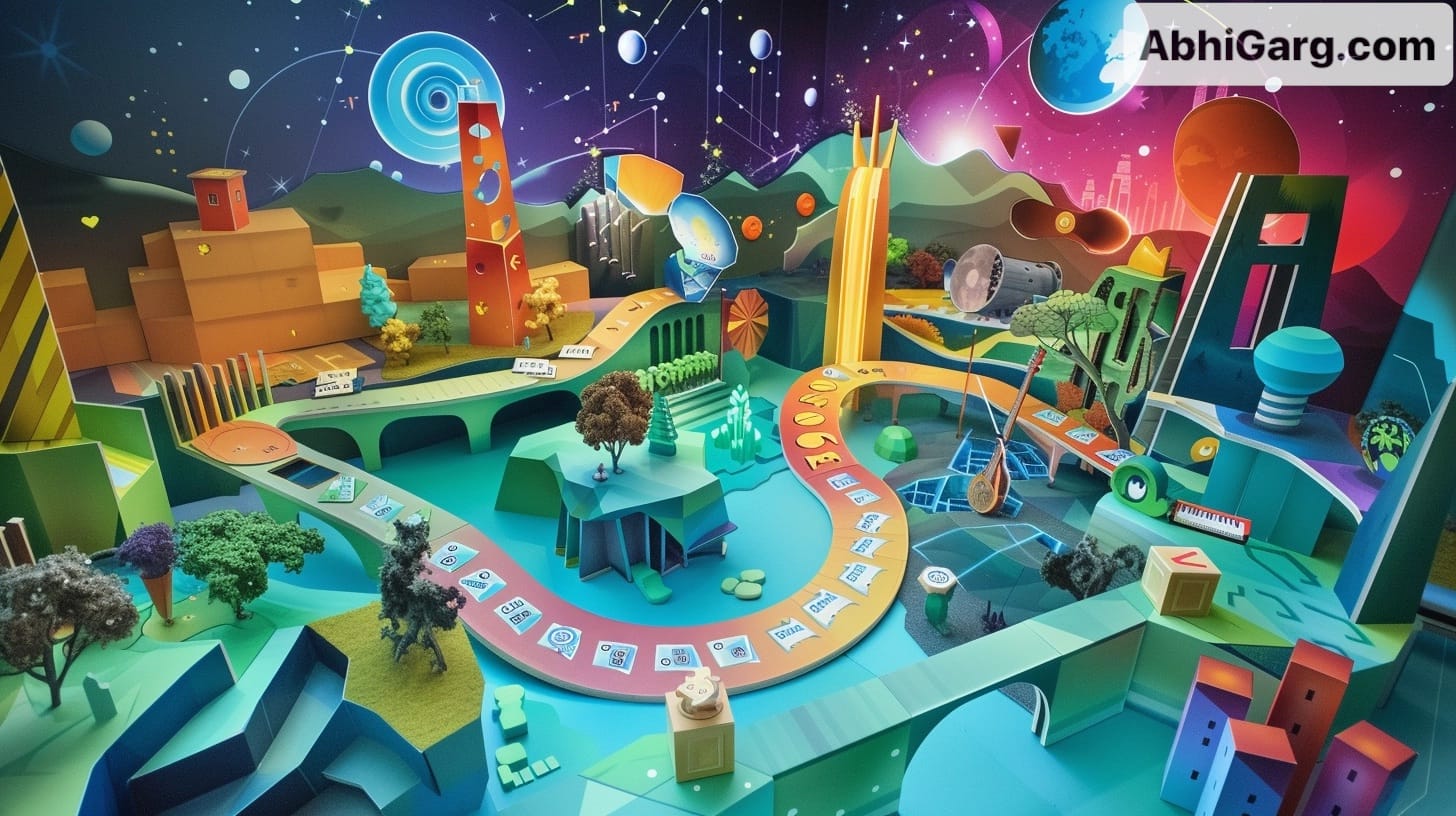Exploring the Metaverse: Key Players Shaping the Future of Virtual Worlds

Introduction
The Metaverse, a term once confined to science fiction, has now become a reality rapidly evolving and shaping the future of technology. It is a shared virtual space where users can interact, create, and engage with digital content in a way that blurs the lines between the physical and virtual worlds. As the Metaverse continues to gain traction, several key players have emerged, each offering unique and innovative solutions to help bring this new digital frontier to life.
This article will explore the prominent players in the Metaverse, spanning various domains, including hardware, networking, computing, virtual platforms, and interchange tools & standards. We will delve into their offerings and examine how they contribute to the development and growth of the Metaverse.
Cryptovoxels: A Virtual World Built on Blockchain
Cryptovoxels is a virtual world platform that leverages the power of blockchain technology to create a decentralized and immersive online experience. Built on the Ethereum blockchain, Cryptovoxels allows users to buy, sell, and own virtual land using cryptocurrency. This unique virtual real estate ownership approach has attracted a growing community of creators and developers eager to build and monetize their digital assets within the platform.
One of the key features of Cryptovoxels is its focus on user-generated content. Users can create and customize virtual spaces, from art galleries and music venues to gaming arcades and social hubs. This level of creative freedom has fostered a vibrant and diverse community of users actively shaping the Metaverse's future.
Unity Technologies: Empowering Developers to Create Metaverse Experiences
Unity Technologies, the company behind the popular Unity game development engine, has been at the forefront of creating tools and technologies for the Metaverse. With its recent acquisition of Weta Digital, a leading digital visual effects company, Unity has further solidified its position as a key player in developing real-time 3D technologies for the Metaverse.
Unity 6
Developers can use the Unity Engine to create immersive and interactive metaverse experiences seamlessly blending the physical and virtual worlds. Unity's powerful suite of tools and assets allows creators to build highly detailed and realistic environments, characters, and objects that can be experienced across a wide range of devices and platforms.
The Sandbox: A Metaverse Platform for Creating and Monetizing Virtual Worlds
The Sandbox is a metaverse platform that empowers users to create, share, and monetize their virtual worlds and experiences. Built on the Ethereum blockchain, The Sandbox utilizes non-fungible tokens (NFTs) to allow users to securely and transparently buy, sell, and trade virtual real estate and assets.
One of The Sandbox's standout features is its user-friendly creation tools. Those without extensive coding or design experience can easily customize virtual spaces using the platform's intuitive drag-and-drop interface. This accessibility has attracted a diverse community of creators, from artists and musicians to game developers and entrepreneurs, who are all contributing to the growth and evolution of the Metaverse.
Roblox: Pioneering the Development of Metaverse Gaming Experiences
Roblox, a global online gaming platform, has been at the forefront of creating immersive and engaging metaverse experiences for its millions of users. What sets Roblox apart is its focus on user-generated content and the ability for users to create and share their games and experiences within the platform.
Roblox provides users robust tools and resources to program their games, allowing for various creative possibilities. The platform has something for everyone, from simple obstacle courses to complex role-playing games. This level of user involvement and creativity has driven behind Roblox's success and helped it establish itself as a leader in developing metaverse gaming experiences.
Decentraland: A Decentralized Virtual Reality Platform
Decentraland is a virtual reality platform that leverages blockchain technology to create a decentralized and immersive online world. Built on the Ethereum blockchain, Decentraland allows users to create, experience, and monetize content and applications within its virtual environment.
One of the key features of Decentraland is its use of non-fungible tokens (NFTs) to represent virtual real estate and assets. Users can buy, sell, and trade these NFTs using the platform's native cryptocurrency, MANA. This decentralized approach to ownership and value exchange has attracted a growing community of creators, investors, and enthusiasts who are all contributing to the development and growth of the platform.
Epic Games: Fortnite and Beyond
Epic Games, the company behind the massively popular online video game Fortnite, has been making significant strides in developing the Metaverse. Fortnite has evolved beyond a simple battle royale game and has become a virtual space where players can socialize, attend concerts, and engage with brands in new and innovative ways.
Epic Games has also invested heavily in developing its Unreal Engine, a powerful tool for creating high-quality 3D content and experiences. The company's vision for the Metaverse involves creating a seamless and interconnected network of virtual spaces where users can move freely and engage with content across different platforms and devices.
NVIDIA Omniverse: A Platform for 3D Simulation and Collaboration
NVIDIA, a leading company in graphics processing units (GPUs) and artificial intelligence (AI), has been making significant contributions to the development of the Metaverse through its Omniverse platform. NVIDIA Omniverse is a powerful tool for 3D simulation and collaboration that allows users to create and manipulate highly detailed and realistic virtual environments.
One of the key features of Omniverse is its ability to facilitate real-time collaboration between users across different locations and devices. This has significant implications for various industries, from architecture and engineering to entertainment and gaming. By enabling teams to work together seamlessly in a shared virtual space, Omniverse is helping to push the boundaries of what is possible in the Metaverse.





Choose your Metaworld.
Microsoft Mesh: Mixed Reality for Collaboration and Shared Experiences
Microsoft, a global leader in technology and innovation, has been making significant strides in developing the Metaverse through its Mesh platform. Microsoft Mesh is a mixed-reality platform allowing people in different physical locations to join collaborative and shared holographic experiences on various devices.
One of Mesh's key features is its ability to create a sense of presence and immersion in virtual environments. Thanks to the platform's advanced spatial audio, 3D avatars, and real-time motion tracking capabilities, users can interact with digital content and each other in ways that feel natural and intuitive. This has significant implications for various industries, from education and training to remote collaboration and entertainment.
Meta Horizon Worlds: Social VR Experiences
Meta, formerly known as Facebook, has been making significant investments in developing the Metaverse through its Horizon Worlds platform. Horizon Worlds is a social virtual reality space where users can create, explore, and interact with others in immersive and engaging ways.
One of the standout features of Horizon Worlds is its emphasis on user-generated content. Users can create virtual spaces, games, and experiences using the platform's intuitive creation tools and share them with others in the community. This level of creative freedom and social interaction has helped to establish Horizon Worlds as a leading platform for social VR experiences in the Metaverse.
Niantic: Augmented Reality for the Metaverse
Niantic, the company behind the popular augmented reality (AR) game Pokémon Go, has been making significant contributions to the development of the Metaverse through its innovative AR technologies. While Pokémon Go may not be a true metaverse experience, it has helped to popularize the concept of blending digital content with the physical world in engaging and interactive ways.
Niantic's vision for the Metaverse involves creating a world where digital content is seamlessly integrated into the fabric of everyday life. By leveraging advanced AR technologies, such as real-time object recognition and spatial mapping, Niantic is helping to create new possibilities for how we interact with and experience the world around us.
Bytedance PICO: Virtual Reality from the Creators of TikTok
Bytedance, the company behind the massively popular social media platform TikTok, has been investing significantly in developing virtual reality (VR) technologies through its PICO platform. PICO is a standalone VR headset that offers users a wide range of immersive experiences, from gaming and entertainment to education and training.
One of the key features of PICO is its advanced inside-out tracking technology, which allows for precise and responsive motion tracking without the need for external sensors or cameras. This immersion and interactivity level has helped establish PICO as a leading platform for VR experiences in the Metaverse.
Apple's Mixed Reality Headset - Vison Pro
Apple Vision Pro promises to deliver a cutting-edge mixed reality experience. It features high-resolution displays with eye-tracking and hand-tracking capabilities, providing users with a seamless and immersive experience. The headset also utilizes spatial audio technology to create a more realistic and engaging soundscape.
Apple's entry into the mixed reality space is a significant milestone for the industry. As a leading technology company with a vast ecosystem of devices and services, Apple's involvement will likely accelerate the adoption and development of mixed-reality technologies.
The Apple Vision Pro is poised to redefine how we interact with the digital world. Its advanced features, powerful hardware, and seamless integration with Apple's ecosystem make it a compelling choice for consumers and businesses.
Conclusion
The Metaverse is a rapidly evolving and highly dynamic space, with new players and offerings emerging regularly. The key players highlighted in this article represent just a small sample of the many companies and organizations that are contributing to the development and growth of the Metaverse.
From virtual world platforms built on blockchain technology to powerful tools for creating and collaborating in immersive 3D environments, the offerings of these key players are helping to shape the future of the Metaverse. As technology advances and more users and creators get involved, we expect to see even more innovative and groundbreaking offerings emerge in the coming years.
Ultimately, the success of the Metaverse will depend on the ability of these key players and others to create experiences that are engaging, accessible, and valuable to users. By leveraging advanced technologies such as VR, AR, AI, and blockchain and by fostering communities of creators and innovators, these companies are helping to lay the foundation for a new digital interaction and exploration era.
As we look to the future, it is clear that the Metaverse will play an increasingly important role in our lives, from how we work and learn to how we socialize and entertain ourselves. By staying updated with key players' latest developments and offerings, we can all be a part of this exciting and transformative journey.
FAQs
- What is the Metaverse?
The Metaverse is a shared virtual space where users can interact, create, and engage with digital content in a way that blurs the lines between the physical and virtual worlds. It encompasses various technologies, such as virtual reality (VR), augmented reality (AR), and blockchain, to create immersive and interconnected experiences. - Who are the key players in the Metaverse?
Some of the key players in the Metaverse include Cryptovoxels, Unity Technologies, The Sandbox, Roblox, Decentraland, Epic Games, NVIDIA, Microsoft, Meta (formerly Facebook), Niantic, Bytedance, and Apple. These companies are contributing to the development of the Metaverse through various offerings, such as virtual world platforms, game development tools, mixed reality technologies, and more. - What is the role of blockchain in the Metaverse?
Blockchain technology plays a significant role in the Metaverse by enabling decentralized ownership and value exchange of virtual assets. Platforms like Cryptovoxels and Decentraland use blockchain to allow users to buy, sell, and trade virtual real estate and assets securely and transparently using non-fungible tokens (NFTs) and cryptocurrencies. - How do game development engines like Unity contribute to the Metaverse?
Game development engines like Unity provide powerful tools and resources for creating immersive and interactive 3D experiences in the Metaverse. Developers can use these engines to build highly detailed and realistic environments, characters, and objects that can be experienced across various devices and platforms. - What sets Roblox apart from other Metaverse platforms?
Roblox stands out in the Metaverse by focusing on user-generated content and empowering its users to create and share their games and experiences within the platform. This level of user involvement and creativity has been a driving force behind Roblox's success and has helped it to establish itself as a leader in metaverse gaming experiences. - How does Apple's mixed reality headset fit the Metaverse landscape?
Apple's mixed reality headset is a high-end offering with advanced features like eye tracking, hand tracking, and spatial audio. As one of the world's most influential tech companies, Apple's entry into the mixed reality space could accelerate the development and adoption of metaverse technologies and experiences. - What role does Niantic, the creator of Pokémon Go, play in the Metaverse?
Niantic, known for creating the popular augmented reality (AR) game Pokémon Go, contributes to the Metaverse by developing innovative AR technologies that blend digital content with the physical world. While Pokémon Go may not be a true metaverse experience, it has helped popularize the concept of interactive, location-based AR experiences, which could play a significant role in the future of the Metaverse.



